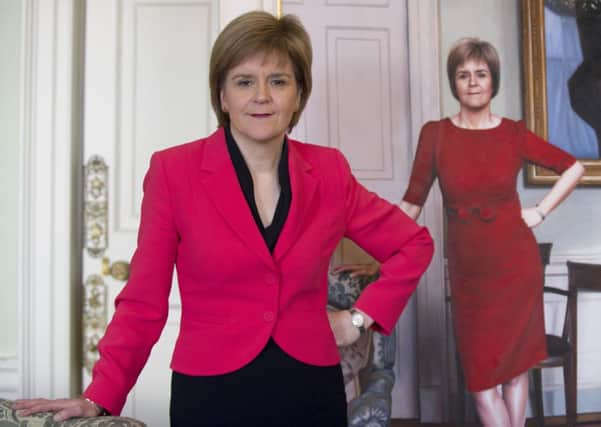Scots public spending £1,200 per head more than UK


The deficit recorded north of the Border was the equivalent of 8.1 per cent of gross domestic product (GDP), a higher figure than the 5.6 per cent of GDP represented by the UK’s deficit of £97.3bn. Despite Scotland’s deficit being larger than the UK average when expressed as a proportion of GDP, public spending was around £1,200 per head higher than the UK average in the last financial year.
The fact Scotland benefits from more generous public spending saw pro-Union parties attack SNP plans for full fiscal autonomy, saying giving Holyrood control over all tax and spend would lead to massive tax rises or savage public spending cuts.
Advertisement
Hide AdAdvertisement
Hide AdThe figures were revealed when First Minister Nicola Sturgeon published her administration’s annual Government Expenditure and Revenue Scotland (Gers) figures at Heriot Watt University, Edinburgh. Ms Sturgeon said she wanted Holyrood to take control over all tax and spend “as soon as possible”, even though figures suggested redrawing the constitution in that way would leave a multi-billion pound hole in public finances.
The First Minister confirmed that the SNP would use any leverage it gains at Westminster to fight for full fiscal autonomy for Scotland. The SNP has indicated that it would make full fiscal autonomy a red line issue in negotiations with Labour in the event of a hung parliament after the May general election.
But her opponents yesterday warned that full fiscal autonomy would mean abandoning the Barnett Formula, the funding mechanism that results in more being spent per capita in Scotland than the UK average, and make Scotland overly reliant on the volatile North Sea oil industry. They added that the funding gap would only get worse as yesterday’s figures did not cover the recent plummeting oil price.
The GERS data showed that total public expenditure in Scotland was £66.4bn, the equivalent of £12,500 per head and 9.2 per cent of the total UK figure.
In the UK as a whole, public expenditure per head was £11,200. When the figures were rounded off that meant spending in Scotland was £1,200 per person higher. When it came to the amount raised in Scotland, on shore public sector revenue was estimated at £50bn, or £9,400 per person – £300 less per person than the UK average.
But when a geographical share of North Sea oil revenue was added it was found Scots contributed more in taxes than the UK average. Including North Sea oil saw total public sector revenue increase to £54bn, a figure that represented £10,100 per person, £400 more than the UK average. When the £400 extra per person raised north of the Border was subtracted from the £1,200 per person extra spending, Scotland remained £800 in the red.
Labour argued that the £800 difference showed the dangers of full fiscal autonomy, arguing that the SNP’s vision would lead to “austerity-max”. Labour’s finance spokeswoman, Jackie Baillie, said: “Some people would describe that £800 as a Union dividend. It exposes the financial fantasy of full fiscal autonomy. If we were to go for full fiscal autonomy there would have to be huge cuts unlike any we have seen before, or huge tax rises.”
Chief Secretary to the Treasury Danny Alexander said: “Today’s figures show that Scotland’s borrowing was £800 per head higher than the UK average last year: that’s £800 more that an independent Scotland would have to tax every man, woman and child.”
Advertisement
Hide AdAdvertisement
Hide AdRevenue raised from alcohol, tobacco and gambling in Scotland was above the UK average. According to the 92-page Gers document, Scotland’s population share of UK revenue was 8.1 per cent. But when the component parts were broken down, Scotland contributed 13.2 per cent of tobacco duties; 9.3 per cent of alcohol; and 9.9 per cent of betting and gaming duties.
FOLLOW US
SCOTSMAN TABLET AND MOBILE APPS